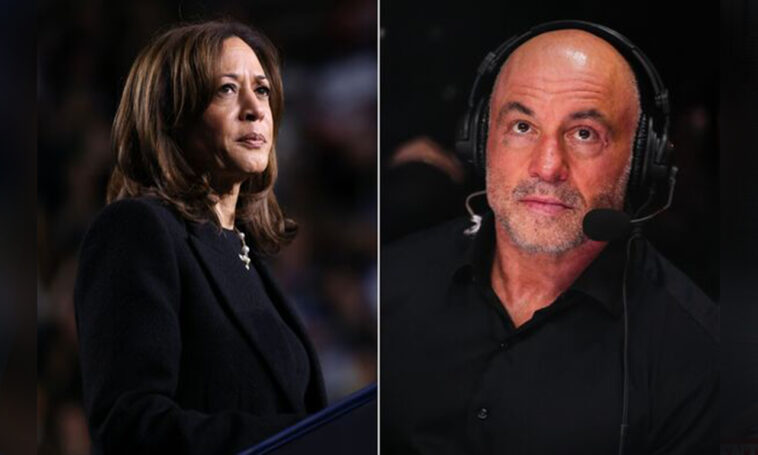Vice President Kamala Harris reportedly declined an invitation to appear on The Joe Rogan Experience, concerned it could provoke backlash from the Democratic Party. According to a report Jennifer Palmieri, a senior advisor to Doug Emhoff, noted that discussions about Harris’s potential appearance were halted due to internal concerns over how the Democratic Party might react.
“There was backlash from some of our progressive staff who didn’t want her on it, fearing how the interview might be received within the party,”
Palmieri reportedly explained. She described the situation as creating a “weird dynamic” between Rogan and Harris’s team after the discussions leaked. Once news surfaced, Rogan reportedly faced pressure from his audience to handle the interview critically, while Harris’s team sought control over aspects of the appearance.
According to Rogan, the vice president’s team imposed several conditions for the interview. These included keeping the discussion to a strict one hour limit and requiring Rogan to travel to meet her rather than recording at his Austin studio. Additionally, he revealed that Harris’s team sought control over topics, with certain subjects off limits, including marijuana legalization. Rogan found this restriction ironic, given Harris’s previous involvement in marijuana policy as a former prosecutor and her current stance within an administration that has taken steps to ease marijuana-related policies.“They had multiple conversations with my team about dates, times, and even what we could discuss,” Rogan stated on his podcast. “She didn’t want to touch on marijuana legalization, which I thought was hilarious given her background.”
The comedian and commentator went on to describe the Harris campaign’s approach as chaotic, implying that Harris might struggle with unscripted, candid interviews.Rogan suggested that Harris’s strengths lie in delivering prepared remarks, typically aided by a teleprompter, and expressed skepticism about her ability to manage impromptu conversations effectively. “She’s solid with pre rehearsed speeches off a teleprompter, but unscripted situations might not be her strength,” he added.Fox News reached out to Harris’s team for a comment on the incident but has not yet received a response.
This episode has drawn attention to the evolving media strategies for high-profile politicians. Harris’s hesitance to engage with Rogan, whose show draws millions of viewers with a wide-ranging audience across political spectrums, may highlight the risks political figures perceive in stepping into less controlled media spaces. For the Democratic Party, Rogan’s platform poses unique challenges. While Rogan’s influence is extensive, his podcast has a history of controversial comments, ranging from critiques of progressive policies to polarizing takes on topics like COVID-19 and free speech, potentially causing hesitation among Democratic figures about how his audience might interpret an interview.
Harris’s campaign’s choice to decline may reflect a broader strategy within the Democratic Party to avoid platforms that could spotlight ideological divides, especially as she navigates a polarized political environment in which public perception is critical. However, Rogan’s large, diverse audience remains attractive to politicians seeking broader reach, even if the content risks stirring tension.
For Rogan, Harris’s decline might signify the widening gap between mainstream politicians and nontraditional media outlets. Known for his unfiltered, long-form conversations, Rogan has hosted various political figures across the spectrum, from Bernie Sanders to Andrew Yang, indicating that a more flexible, less restrictive interview style could be welcomed by independent or unconventional candidates.
While the Harris campaign ultimately chose to forego this opportunity, this situation underscores how modern political campaigns are increasingly calculating when it comes to appearances in independent media, weighing both the potential reach and risks.






Join the Community and Be a Part of the Conversation
You must be logged in or registered to post a comment.